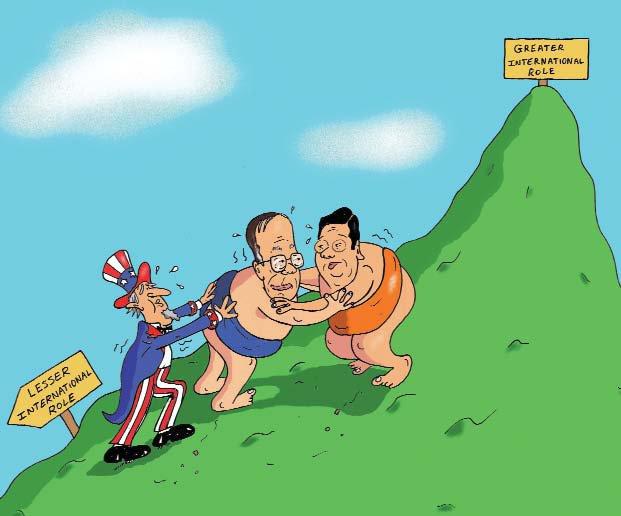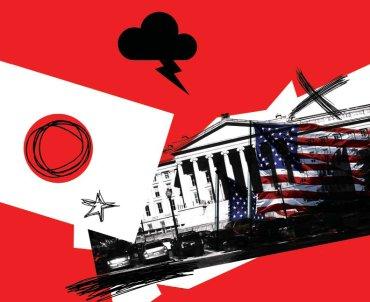On The Rocks?
Implications of recent domestic political developments for the US-Japan alliance
By Adam P Liff
 Illustration by Mike Sparrow (www.mikesparrow.com)
Illustration by Mike Sparrow (www.mikesparrow.com)
The political drama ensuing from the opposition Democratic Party of Japan (DPJ)’s historic takeover of the House of Councillors this past summer continues to dominate newspaper headlines nearly six months later. The poster child for the consequences of the nascent power split between the upper and lower houses, which the Japanese media have creatively christened a ‘twisted Diet,’ has been none other than controversy surrounding the extension of the so-called Anti-Terrorism Special Measures Law (ATSML). The failure of the ruling coalition to pass this legislation, which ultimately resulted in the November 1 withdrawal of Self Defense Force (SDF) vessels from a refueling mission in support of US-led coalition operations in Afghanistan, has aroused concern in US policy circles about the reliability of Japan’s commitment to assume a more active role in international security. The US ambassador, for one, framed the issue in manichean terms at a Japan National Press Club meeting in late October, stating that SDF withdrawal could be perceived as tantamount to Japan “opting out of the War on Terror.”
While some observers insist on equating SDF withdrawal with Tokyo reneging on its alliance commitments, such an interpretation, which conflates the debate over the ATSML with support for the US–Japan alliance as a whole, is a clear case of not seeing the forest from the trees. First, the raison d’être of the alliance lies not in the Middle East but in East Asia, a region where it has served as the bedrock of peace and stability for five decades. Second, what has been largely overlooked in the political drama of recent months is the nature and significance of the debate presently taking place within Japan about its global role.
The recent challenge presented by the DPJ has triggered a level of public discussion concerning Japan’s contributions to the international community that is unmatched in recent memory. The DPJ leadership’s decision to oppose the ATSML was highly politicized and framed primarily on (somewhat dubious) legalistic grounds. In stark contrast to Japan’s traditional pacifistic post-war opposition parties, much of the party’s rank and file is not categorically opposed to SDF dispatch overseas. Ichiro Ozawa, DPJ kingpin and the legislation’s most outspoken critic, has been an unabashed champion of Japan adopting a more proactive role in international affairs for well over a decade. Some other DPJ politicians have openly called for an ippanhou, or ‘general law,’ governing SDF dispatch. In short, while it is essential to acknowledge the existence of internal divisions on this issue, far from playing a spoiler role to LDP ambitions, the DPJ’s growing power may have finally set the stage for Japan to establish a permanent legal foundation for SDF dispatch. From the US perspective, rather than applying pressure on Tokyo to resume its refueling mission, the long-term interests of the alliance would be better served by encouraging Japan to continue this internal debate.
 Illustration by Phil Couzens (www.freesouldesign.co.uk)
Illustration by Phil Couzens (www.freesouldesign.co.uk)
While recent domestic developments should allay most fears that the SDF’s November withdrawal is a sign that Tokyo is abandoning a more active international posture, it would be irresponsible to unconditionally assume that the vehicle through which Japan will pursue a more proactive foreign policy will indefinitely remain its alliance with the US. The DPJ, for one, has done little to instill confidence in Washington, often criticizing Japan’s ruling coalition for being overly amenable to US demands while simultaneously articulating no clearly defined alternative alliance policy of its own. While support for abrogation of the alliance has declined sharply in recent years, there is nevertheless a growing belief within Japanese policy circles that the global playing field is leveling and there is a concomitant need to place a greater focus on regional and global multilateral institutions. While this may seem to bode ill for the alliance’s future, it need not be thought of in zerosum terms. As US officials are wont to emphasize in negotiations with Japan, the alliance should be adaptable to changing circumstances. Henceforth, its future sustainability will hinge not only on the outcome of Japan’s ongoing internal debate about its global role, but also on how both sides, in particular the US, respond.
Japan will at no time in the foreseeable future become the ‘UK of Asia’.
One of the most important factors in determining the continued viability of the alliance is that US expectations of how much Japan is able to contribute overseas remain realistic. Japan’s Official Development Assistance (ODA) budget has dropped by nearly 40% since reaching a peak in 1997. While ideological pacificism has declined in recent years and most Japanese are permissive, if not supportive, of an enhanced role for the SDF overseas, Japan will at no time in the foreseeable future become the ‘UK of Asia.’ Japan’s defense budget continues to decline and currently accounts for little more than 0.9% of GDP. Public opinion poll data concerning support for revision of the Constitution’s Article 9, which renounces war and forbids Japan from maintaining a full-fledged military, remain at best inconclusive. Even with revision, the percentage of Japanese who support the SDF using force overseas number in the low teens. Calls by several right-wing politicians for ‘value-based diplomacy’ are destined to fall on deaf ears as any attempt to toe such a line would only isolate Japan from many of the very neighbors with which it needs to cooperate. Finally, while it is increasingly popular to speak of Japan becoming a ‘normal country,’ what often goes unsaid (or unappreciated) is that ‘normal’ does not mean behaving like the US (a country that on almost every relevant measure proves to be the exception rather than the norm), but more in line with international standards of other advanced industrial nations.
It remains an open question whether there is sufficient will in Tokyo and Washington to see that the alliance evolves to meet these challenges.
US leaders must show greater appreciation for fundamental changes taking place in East Asia, not only China’s rise but also rapidly expanding support for region-wide community building. The emergence of a number of security threats in non-traditional areas such as the environment, energy security, and maritime piracy make it abundantly clear that while the traditional ‘hub-and-spoke’ system of US security arrangements will continue to play an integral role in ensuring regional stability for the foreseeable future, new challenges will increasingly demand more cooperative (I.e. Multilateral) solutions. Unfortunately, it remains an open question whether there is sufficient will in Tokyo and Washington to see that the alliance evolves to meet these challenges.
Lastly, it is imperative that the two countries stop talking past each other and both actively address bilateral frictions head-on, while also acknowledging the existence of certain core differences. Disparate views over how to best approach the North Korea issue and the US’ lukewarm support for Japan’s bid for a permanent seat on the UN Security Council are two examples of issues that, if they continue to be slighted, could fester and deal a serious blow to bilateral relations. On the other hand, the importance of acknowledging core differences has become increasingly relevant in the wake of the previous Japanese administration’s emphasis on ‘value-based diplomacy’ and the creation of an ‘arc of freedom and prosperity’ in East Asia. Such rhetoric, while no doubt pleasing to the current US administration in the short term, will most likely result in miscalculation and further disappointment in Washington once it becomes clear that the Japanese electorate is uninterested in pursuing a confrontational foreign policy line.
JI
Adam P Liff is a MEXT research scholar affiliated with the University of Tokyo’s Graduate School of Law and Politics and writes frequently on Japanese politics and foreign policy. He can be contacted through his website: www.adamphailliff.com





